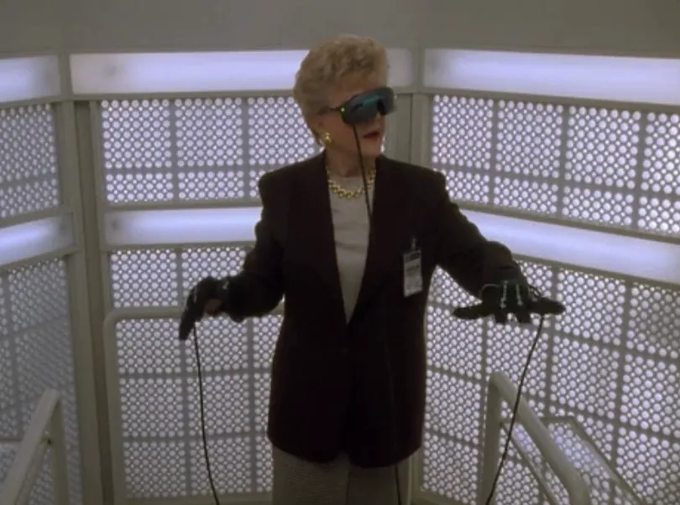Trump said Miss USA gave a “great answer” when she said “There is a tradition of natural-born women. But today when there are so many surgeries and so many people who need to change for a happier life. I do accept that.”https://t.co/AiDTP62Gz3
— Ron Filipkowski (@RonFilipkowski) June 16, 2023
Kari Lake and friend.
In the mid-Seventies, All in the Family, the most popular TV show in the country routinely watched by over twenty million households, would feature a drag queen as a beloved recurring character.
By the Eighties, the topic was safe enough for the least edgy show on television to do an episode on it.
Love Boat and how they addressed transgender issues back in 1982. pic.twitter.com/BxvN8I6zAY
— AskAubry 🦝 (@ask_aubry) April 30, 2023
As Aubry points out later in the thread, the captain is baiting Gopher to get him to move past his initial bigotry, which was a familiar element of what was a common sitcom plot for at least forty years. Old friend/lover turns up having transitioned. lead character freaks out, mentor/trusted advisor reminds them that their friend is still their friend, and they learn to move past their prejudices.
You can argue that these episodes were patronizing and that the message would have rang truer had producers actually hired a trans actor (which, with the exception of All in the Family, was almost never the case), but the important part, at least with respect to this post, is that it was no big deal. The producers undoubtedly got a few angry letters, maybe even lost a handful of viewers, but outside of a few small groups, no one paid any attention.
Trump in 2016: “As your president, I will do everything in my power to protect our LGBTQ citizens.” pic.twitter.com/J55WUgSmDf
— Ron Filipkowski (@RonFilipkowski) June 13, 2023
As recently as 2016, the GOP's nominee would say in his acceptance speech, “As your president, I will do everything in my power to protect our LGBTQ citizens” and no one would really care. And in this one case, Trump is not an outlier. You can find any number of examples of prominent Republicans taking LGBTQ positions that were entirely mainstream but which would outrage the base today.
Left: Fox News claiming the pride flag the White House used promotes pedophilia.
— Matthew Gertz (@MattGertz) June 14, 2023
Right: Fox’s parent company promoting its inclusiveness in 2022 by wrapping its corporate logo in the very same flag in a corporate social responsibility report. https://t.co/xhq4Myio5i pic.twitter.com/HOzHKRkW4k
There has always been homophobia and transphobia in our society just as
there has always been racism, misogyny, and religious bigotry. It is
important to acknowledge our history here, but there is a danger when
looking at how much things are the same, of blinding ourselves to see to
what extent things have changed in a dangerous and frightening way.
All this over a rainbow rocking chair outside. It was never about kids. It’s about wanting people back in the closet, and hate. pic.twitter.com/0g4RTN915I
— Ron Filipkowski (@RonFilipkowski) June 11, 2023
This is not the Onion. https://t.co/a6xRMMI2dK pic.twitter.com/xPKBTbuAZ1
— Alejandra Caraballo 🏳️🌈🏳️⚧️🇵🇷 (@Esqueer_) June 14, 2023
As Bob Chipman has pointed out, for decades, companies like Disney have leaned toward a mild, performative liberalism because it was good business. This mostly consisted of empty gestures like putting up a rainbow flag this time of year or running an ad with Fredrick Douglass during Black History Month, or declaring their love for the planet on Earth Day. These things were and are generally popular and allowed the huge corporations to come off as compassionate and concerned. This used to be the safest path, but times have changed.
Target pulled certain products from its Pride collection, citing confrontational behavior by shoppers and the need to protect its employees. Bud Light walked back its brief collaboration with a transgender TikTok influencer, but that didn’t stop it from losing its long-held status as America’s best-selling beer. The brand’s parent company, Anheuser-Busch, issued a quasi-apology for simply doing business with a trans person, but that doesn’t seem to have appeased transphobic boycotters. At the same time, it appears to have alienated LGBTQ people and their allies.
“When Kid Rock took out an automatic weapon and shot up a case of beer, you did not see anyone from Anheuser-Busch saying, ‘Hey this isn’t OK,’” said Mark Robertson, who has been watching these events play out from Chicago. He co-owns four LGBTQ bars in the city that used to serve a lot of Anheuser-Busch products until that apologetic statement from the CEO prompted Robertson to cut ties.
There's a lot of good reporting in Savannah Maher's piece, but it falls down badly on the most important part of the story. Yes, LGBTQ marketing always generated protests -- there were angry letters and an occasional blip of publicity and a few people actually followed through with their "I'll never shop here again" threats, but on the whole the numbers were trivial and the positive PR and access to new markets far outweighed any downside. It was good business.
Being mildly pro-diversity has gone from the safest business strategies to being one of the riskiest because a majority of the conservative base has suddenly started passionately caring about something they never cared about before.
Trump notes his crowd is more enthused about bigotry than they are for tax cuts: "It's amazing how strongly people feel about that. I talk about cutting taxes, people go like that, I talk about transgender everybody goes crazy. Five years ago you didn't know what the hell it was" pic.twitter.com/n1xoeCIL5C
— Aaron Rupar (@atrupar) June 11, 2023
Though I know we are not supposed to be this blunt, it is difficult and probably counterproductive to try to ignore the Nazi in the room. The parallels are simply too obvious, not just with the Third Reich's persecution (culminating in mass murder) of homosexuals, but with the larger obsession with perceived decadence, and most of all in the way that a fairly low level and even arguably diminishing level of bigotry can suddenly boil over into a terrifying collective madness.






